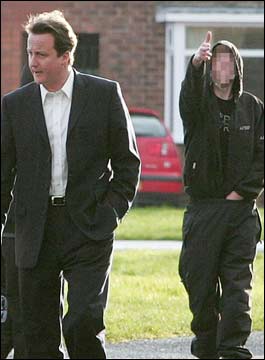Britain suffers from a very peculiar disease. For most of the 20th century, despite being a nation that is increasingly secular and God-mocking rather than God-fearing, we put up with the so-called moralists and those in power who were in behest to them and their friends in the media deciding what we could or could not watch or see. From Lady Chatterley's Lover to the video nasties moral panic, and the redux of that whole ridiculous scare in the aftermath of the murder of James Bulger, censorship was the norm and something that was accepted rather than challenged. It's only been with the advent of the internet, and with the public finally deciding that those in their ivory towers don't know best that this tyrannical situation has finally been somewhat eroded.
It's with this in mind that we ought to approach Gordon Brown's surprise announcement that Ofcom is introduce a "labelling" system for new media content:
The chancellor said that Ofcom, the industry regulator, has agreed to introduce a media content rating scheme to provide better information about websites, TV programmes, computer games and other media.
An Ofcom spokesman said the labeling system will cover all media content in a "text-based" form. This will spell out the level of nudity involved in the content, for example.
"We have not set in stone yet is what these labels will look like but it won't be like age related labelling you get in cinema classifications."
How Ofcom are going to be able to classify or "rate" every web site, or how they're going to get websites to provide this labelling isn't made clear. How on earth can they rate YouTube and other so-called Web 2.0 sites, anyway? As for TV programmes, while a labeling system could potentially be helpful, those programmes which are likely to cause offense are already introduced with warnings that they contain strong language, violence, nudity, sex, etc. Most computer games which feature such content are now submitted to the BBFC, while those that aren't feature the PEGI ratings.
Mr Brown drew on his own experiences as a father to expose the new challenges faced by parents trying to teach their children right from wrong as sensationalist images of violence, drugs, and sex proliferated on the internet and other new media outlets.
"How we counteract this is a central concern for me as a parent and for all parents I know, and this is an issue we must address with practical proposals to address the challenges we face," said Mr Brown.
"We want to promote a culture which favours responsibility and establishes boundaries: limits of what is acceptable and unacceptable.
"We can't and shouldn't seek to turn the clock back on technology and change. Rather we need to harness new technology and use it to enable parents to exercise the control they want over the new influences on their children."
As long as this culture is only one in which parents decide what is acceptable and unacceptable for their children to watch or play, then I don't have much problem with what's being suggested, as long as it is purely voluntary and Ofcom comes up with an accountable system that can be challenged and which is far more fleshed out from the back of the fag packet drafting which seems to have gone on so far.
The regulator will also conduct an information campaign to let parents know about the software available for computers and TV set-top boxes to control what their children see.
This ought to be first priority for Ofcom, rather than developing a system when they've yet to show how it'll work, especially online. Those concerned about their children's computer use first stop ought to be install a NetNanny type program, especially if they're under say, 12. They provide a far better service than anything the government or Ofcom will come up with.
It wouldn't be this government though if there wasn't the faint whiff of velvet fascism, and it comes in this paragraph:
Other measures will include persuading technology manufacturers to give better information on blocking software and investigating new ways of restricting access to violent and obscene material sent over the internet.
For those of us who've progressed past the stage of having our nappies changed, with a few obvious exceptions (child pornography) the last thing that's needed or wanted is further methods of blocking content which we can decide on whether we want to see or not. Besides, the Chinese, Iranians and Turks seem pretty adept at being able to block certain content, but I suppose it might look bad if we started asking them for help on how to stop our own citizens for looking at that particular beyond the pale website.Labels: censorship, Gordon Brown, labelling, Ofcom


